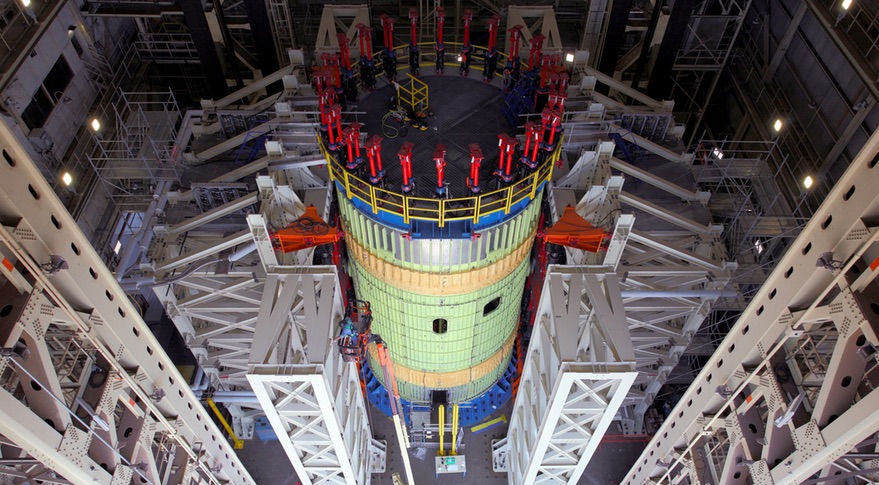
A new report from the Government Accountability Office found that the prime contractors for the Space Launch System and Orion spacecraft received hundreds of millions of dollars in award fees despite continued issues that will likely lead to further delays in the programs.
The June 19 report, which included an unusually strong response from NASA, concluded that the agency should use upcoming contract negotiations with Boeing for the SLS, and Lockheed Martin for Orion, to find different ways to structure award fees “to incentivize contractors to obtain better outcomes.”
“NASA’s award fee plans for the SLS stages and Orion crew spacecraft contracts provide for hundreds of millions of dollars to incentivize contractor performance, but the programs continue to fall behind schedule and incur cost overruns,” the report stated.
Boeing, for example, received $271 million in award fees over the life of its SLS contract, the report noted. That includes $146 million since NASA established formal cost and schedule baselines for the program, 81 percent of the total that Boeing could have earned.
Boeing received evaluation scores of “excellent” or “very good” since 2014, with the exception of the most recent period included in the report of October 2017 through September 2018, when it received a lower score of “good.”
During that time, though, the schedule for the first SLS launch has slipped by several years. The GAO noted in its report that the program won’t meet a planned June 2020 launch date because of ongoing issues, particularly with the development of the rocket’s core stage. NASA officials have said there is six to 12 months of “risk” to that launch date, meaning it could slip to as late as June 2021.
Dennis Muilenburg, the president and chief executive of Boeing, didn’t address the report in a June 19 speech at the John F. Kennedy Library in Boston where he discussed the company’s various space activities, including SLS. “The first launch is next year, an uncrewed launch,” he said.
At a meeting of a NASA Advisory Council committee May 28, Bill Hill, deputy associate administrator for exploration systems development at NASA, said the agency was still trying to carry out the first SLS launch in 2020 even if decides to retain a “green run” static-fire test of the core stage. “Obviously, everything has to go perfectly” to maintain that 2020 launch date, he said, “but there’s a shot.”
The GAO report suggested that NASA and Boeing were blaming each other for the delays in the SLS development. NASA said that Boeing didn’t hire enough technicians to work on the core stage, initially assigning 100 people before eventually increasing that to 250. Boeing countered that NASA provided new estimates of the loads the stage would experience after critical design review, changes significant enough “that they invalidated legacy systems Boeing had planned to use, which required rework.”
The GAO also criticized NASA for underestimating the cost increases in the SLS program. According to the agency, the cost of SLS development has grown by a little more than $1 billion, or 14.7 percent, above its baseline cost estimate of $7.021 billion. The report noted, though, that during a replanning effort in late 2017 NASA shifted some costs associated with getting SLS ready for its first launch to later in the program. That in effect reduced the baseline cost by $782 million, making the effective cost increase now 29 percent. That is close to the 30 percent threshold for cost overruns where a program must be formally reauthorized by Congress.
The report identified problems as well with the Orion program as well as Exploration Ground Systems, which includes the mobile launcher and other equipment and services needed to support SLS/Orion launches. Lockheed Martin has earned $294 million in Orion award fees over the course of its contract, including $88 million, or 93 percent of the total available, since its confirmation review.
“The Orion program is not on schedule to meet the June 2020 launch date for the first mission,” the report stated, in part because of delays in the European-built service module. The spacecraft’s crew module, though, is “nearly [on] the critical path” because of component failures in its avionics system found during testing.
In an eight-page letter included in the report as NASA’s response, Bill Gerstenmaier, NASA associate administrator for human exploration and operations, vigorously defended the agency’s handling of SLS, Orion and ground systems.
“The GAO report does not acknowledge NASA is constructing some of the most sophisticated hardware ever built,” he wrote. As he has done in the past, he said that the problems NASA and its contracts have encountered “are commensurate with first-time production programs on a large scale and should not be unexpected.”
“The GAO report repeatedly projects the worst-case scenario outcome,” he wrote later in the letter, adding that NASA “does take exception to the unnecessarily negative language used in the report title and section headings and the lack of acknowledgement of progress the Agency has made.”
Despite that criticism, Gerstenmaier said that NASA concurred, partially or entirely, with the four recommendations that the GAO made, ranging from adjusting the SLS cost baseline to reevaluating strategies for incentive awards to its contractors.
The GAO, which usually limits its reaction to agency responses to how they accepted the report’s recommendations, included several additional comments regarding the NASA letter, including one about the use of worst-case scenarios. The GAO responded that senior NASA officials told them a June 2020 launch was “unlikely” because of development issues.
“It would be misleading for us to continue to report the June 2020 launch date when we were told there was substantive risk to that date,” the report stated. “We then used the information NASA provided us to report that the first launch may occur as late as June 2021, if all risks are realized.”
